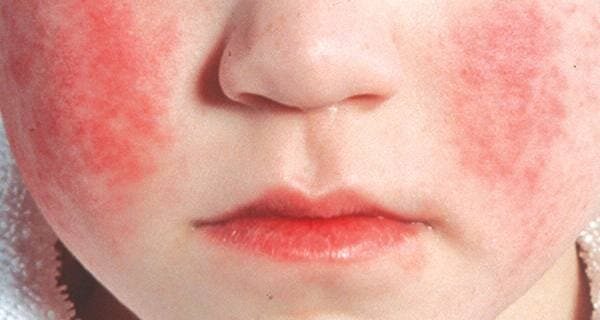The Centers for Disease Control and Prevention (CDC) released a Health Alert Network Advisory on August 13 regarding Parvovirus B19, or Fifth Disease, as it is commonly known. The CDC is a federal agency in charge of protecting public health.
Why Did The CDC Issue this Alert?
Parvovirus is not a notifiable disease, but the CDC observed that 14 European countries had reported increased Parvovirus B19 cases in the first quarter of 2024. The United States also started to report an uptick in cases. Data from large commercial laboratories indicated increased Parvovirus B19 cases among pregnant women and patients with sickle cell anemia.
Plasma donor samples also reveal increased numbers testing positive for Parvovirus B19. The highest increase was in children aged 5 – 9, with more than double the cases of positive testing compared to previous years. The significant increase in samples testing positive for Parvovirus B 19 prompted the CDC to issue this advisory for all healthcare practitioners, health centers, and the general public.
What is Parvovirus B19 or the Fifth Disease?
An Introduction
Parvovirus B19, or the Fifth Disease, is characterized by a rash on the cheeks that looks like a slap. The disease is also called ‘ slapped cheek disease” due to this symptom. Fifth disease is a common mild illness normally seen in children between 5 to 15 years of age. It is more prevalent in spring and winter. It generally goes away on its own.
Fifth Disease: The Reason Behind This Name
Parvovirus B19 is also called the ‘ Fifth Disease” because it was tagged as number five in a list of six childhood diseases with a prominent skin rash.
The diseases are as follows;
- Measles
- Scarlet fever
- Rubella
- Duke’s disease
- Parvovirus B19, and
- Roseola
Symptoms of Parvovirus B19
Many people who get this disease may not have any symptoms. They remain asymptomatic, although they can still spread the infection.
Common symptoms are;
- Flu-like symptoms of fever, cough, cold, sore throat, sneezing
- Rashes
- Joint pains: Are more common in adults.
The symptoms occur in two phases.
The first phase:
- Flu-like symptoms include fever, general listlessness, cold, and sore throat.
- This first phase of symptoms happens seven days after catching the infection.
The second phase:
- Happens seven to ten days after the first phase.
- Facial rash develops in children and may later be found in other body parts.
- Joint pain
- In adults, the second phase is more prominent. They may develop a rash on the trunk and joint pain in wrists, hands, feet, and knees.
The third phase: May last a couple of weeks.
- The rash spreads to the chest and other parts of the body.
- It starts to look lacey.
- It is painless but may be itchy.
It is triggered by heat, sunlight, stress, very cold temperatures, and exercise.
How does Parvovirus B19 Spread?
Parvovirus B19 spreads very fast.
- Usually spread through sneezing. Half of the household members will likely catch this infection if one person in the house is infected.
- In a school setting, 20 to 50% of students and adult staff are likely to get sick from transmission of the virus from a sick person.
- Transfer of disease from mother to fetus during pregnancy.
- Parovirus B19 can be transferred through infected plasma or blood components to a person.
- Once the rash develops, the infected person does not transfer the disease into his surroundings, and other people do not get sick with Parovius B19.
Immunity from Parvovirus B19
About 50% of adults develop immunity to this disease by age 20. 70% of adults develop immunity to Parvovirus B19 by age 40.
Care and Treatment of Parvovirus B19
- The symptoms generally go away on their own. Treatment, if any, is supportive and based on the presenting symptoms.
- No vaccine or specific treatment is available for this Illness.
- Visit a doctor if:
– The child’s fever is more than 102*F. - Severe joint pain
– If the patient is pregnant and has severe Parvovirus Symptoms
– If the patient has an Immunocompromised condition like cancer or blood diseases
Health Complications Due to Parvovirus B19
Most healthy people are asymptomatic, i.e., they do not show symptoms when contracting this disease. Others who do get symptoms get well soon without any treatment. However, some may develop complications if they get infected with Parvovirus B19 as follows;
- Pregnancy: Fetal Parvovirus B19 may occur during pregnancy. Most cases do get well on their own without any treatment. The risk for an adverse fetal outcome is highest when the infection occurs during weeks 9 – 20 of pregnancy. The treatment for fetal Parvovirus B19 is supportive and is most often done for fetal anemia.
- Immunocompromised persons with cancer, organ transplant, HIV, and hemolytic disease patients are at greater risk if they contract Parvovirus B19. They tend to develop aplastic anemia. Treatment is supportive to boost blood count.
Precautions To Be Taken During This Time By The General Public
- Know about Parvovirus B19.
- Know the common symptoms and precautions.
- Stay safe in public places. If sick, wear a mask to prevent spread to other people.
- Seek medical care if you are pregnant and have been in contact with a person infected with Parvovirus B19.
- Seek medical care if you are an immunocompromised person and have been in contact with a patient with Parvovirus B19 or have contracted Parvovirus B19.
Summary
Parvovirus B19 is a mild, common illness. It does not cause any problems for healthy individuals. Many remain asymptomatic. However, few individuals, like pregnant people and immunocompromised persons, have to exercise due care and visit a doctor if they feel they have been exposed to or contracted this virus.
The Parvovirus B19 is most contagious during the first phase of illness. Once the rash develops, the patient is no longer contagious. Practice respiratory hygiene and wear a mask if required. Encourage children to wash their hands often.








